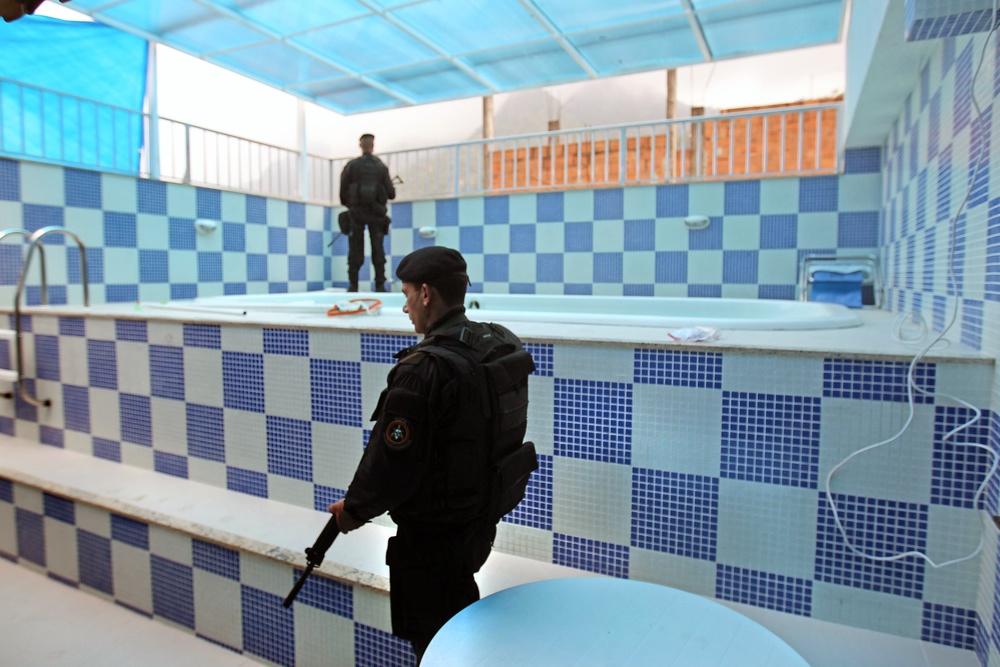Brazil’s favelas fight is about to get ugly
This pool belonged to a drug lord named Peixe, or Fish, in the Rocinha slum.
The whomp-'em raid in the Rio favela of Rocinha on Sunday morning was pretty intense, even by police-action standards.
Helicopter gunships, tanks and 3,000 troops stormed into the slum. The goal was to run out the drug traffickers who rule the place.
When they got there, though, nobody was home.
The drug traffickers had set up barricades and slicked the roads with oil to make it tougher. They had also taken most of their belongings, leaving behind only some small arms and the traces of their lavish lifestyle, which played out in a community of people living in makeshift shacks.
Brazil's officials declared this a win. They plan to occupy the place forever, if necessary, and guarantee security for the residents of Rocinha.
Which is a really nice sentiment, and a good idea, in theory. Clear, hold and build. Haven't we heard that before?
Brazil has now joined Colombia and Mexico in playing Whack-a-Mole with the drug traffickers, who have become smarter, and more importantly, more rich — more powerful, that is. Will it work? Maybe. I'd love to be proven wrong. But the odds aren't great.
In Colombia, the government has been in a pretty rough fight. Despite just having killed Alfonso Cano, the commander of the FARC guerilla group, Colombia President Juan Manuel Santos is actually talking about legalizing cocaine. That's how bad things are.
In Mexico, 40,000 have died since President Felipe Calderon declared war on the traffickers in 2006. Things are so bad that now, even bloggers who post about the cartels are being murdered in gruesome ways. People say dire things like, "Is no one safe?" That's not ever something you want citizens saying about your country.
And now, there are reports that the Marines, the Mexican government's saving hope, because they're US-trained and far less corrupt than the police, have been unleashed on the population. We all know what happens when you give ripped dudes big guns, point out some bad guys, and tell them not to worry about the rules.
Anyway. This is to say that while Rocinha seems quiet, for now, this fight is by no means over. This from our report by Tom Phillips on the operation:
Faced with an unprecedented show of government force, those traffickers who had not already fled appeared to have melted into the rainforests that flank the hillside community. It was a sign that for now, at least, the traffickers finally fear Rio’s security forces.
They've melted into the rainforests. Drug traffickers are now in the rainforests, seriously. Does anybody really think these guys are going to stay there? Rainforests are really nice. But they don't have swimming pools. Already, there's signs the traffickers are moving on. From the AP today:
"We're seeing a migration of the drug trade to other areas of Rio," [Brazil's former drug czar, Walter Maierovitch] said. "The traffickers forced to leave one area are just taking up territory elsewhere. This is going to generate more conflicts because they're going to areas already occupied by other factions."
That's what led to the recent spate of violence in Mexico — fights over territory as cartels preyed on each other.
Brazil officials have said they're also trying to take everyone's guns away, though, which could curb the violence. But as long as traffickers can find some base of support, it seems like this is going to be a long, ugly fight — without any significant interruption in the drug-supply chain.
Every day, reporters and producers at The World are hard at work bringing you human-centered news from across the globe. But we can’t do it without you. We need your support to ensure we can continue this work for another year.
Make a gift today, and you’ll help us unlock a matching gift of $67,000!
